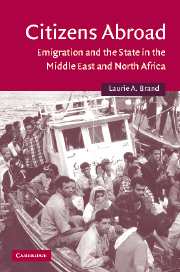Book contents
- Frontmatter
- Contents
- List of tables
- Preface
- List of acronyms
- 1 States and their citizens abroad
- 2 State sovereignty, state resilience
- 3 Morocco: expatriates as subjects or citizens?
- 4 Tunisia's expatriates: an integral part of the national community?
- 5 Lebanon and its expatriates: a bird with two wings
- 6 Jordan: unwilling citizens, problematic expatriates
- Conclusions: transnationalism, security and sovereignty
- Bibliography
- Index
- Cambridge Middle East Studies 23
1 - States and their citizens abroad
Published online by Cambridge University Press: 22 September 2009
- Frontmatter
- Contents
- List of tables
- Preface
- List of acronyms
- 1 States and their citizens abroad
- 2 State sovereignty, state resilience
- 3 Morocco: expatriates as subjects or citizens?
- 4 Tunisia's expatriates: an integral part of the national community?
- 5 Lebanon and its expatriates: a bird with two wings
- 6 Jordan: unwilling citizens, problematic expatriates
- Conclusions: transnationalism, security and sovereignty
- Bibliography
- Index
- Cambridge Middle East Studies 23
Summary
While scholars remain divided as to whether population movement in the post 1945 period in fact surpasses the magnitudes of earlier periods, the issues of who, why, when, how, and to what effect people move from farm to city, town to town, or country to country have received increasing scholarly and policy attention in recent years. Researchers across disciplines have sought to answer these and related questions, focusing on a variety of levels and units of analysis, and drawing upon myriad theoretical frameworks and empirical tools. While some have looked at the micro-level questions of individual decisions to migrate and their impact, often emphasizing economic cost–benefit calculations or push-pull factors, others have posed community or societal-level questions, as they have sought to understand the cultural impact of immigration, various historical aspects of the immigrant experience, or the possibilities for integration or assimilation in the new host country. In the fields of political science and international relations, explanations have often been sought for governmental response to immigration, with some analysts locating their explanations at the level of the state, others in the international political economy, and still others in changes in international norms.
If migration or immigration studies have been remarkable in terms of the diversity of treatment and disciplinary interest noted above, they have, conversely, been, in their majority, surprisingly limited geographically: most of the work that has been done on the question of the permeability of borders, border controls, citizenship and migration or immigration (as opposed to work solely on citizenship) has dealt with Western Europe and the United States.
- Type
- Chapter
- Information
- Citizens AbroadEmigration and the State in the Middle East and North Africa, pp. 1 - 23Publisher: Cambridge University PressPrint publication year: 2006



